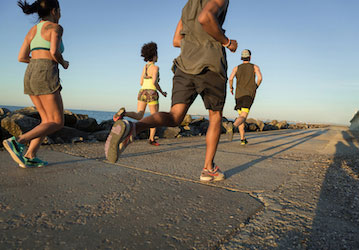The support you receive from those who’ve “got your six” influences your health and performance. Your family, friends, coworkers, and community might support you emotionally by expressing empathy, care, and love. Their support can also come in the form of useful advice or help with tasks. Through any or all of these ways, when you feel supported by others, you’re more likely to excel in your total fitness pursuits. During HPRC’s #GotMySix challenge, learn how your sources of support impact your total fitness.

#GotMySix and exercise
Support from family and friends can help you achieve your fitness goals—whether you’re improving your run time or recovering from injury—and boost your self-esteem. Maybe your buddy goes with you to the gym and spots you while you lift weights. Or you have a certain friend or family member who encourages you to work out when you really don’t want to. Maybe they remind you about the importance of rest and recovery for optimal performance. It’s important to recognize those cheerleaders in your life—whether they’re on the sideline or sweating it out beside you.
#GotMySix and mental fitness
Your sources of support boost your mental fitness when they notice your feelings and listen to your concerns. Strong support from others can increase your resilience and help you deal with military stressors, such as training, deployment, or the transition to civilian life. For example, greater levels of perceived support during post-deployment are linked to Service Members having a better sense of confidence, competence, and even humor. Post-traumatic stress disorder (PTSD) symptoms also decrease faster and in severity for Service Members who report feeling socially connected and supported. Social support helps you reach your goals too. Setting goals alongside others can help you reach those goals faster and stay accountable as you make progress.
#GotMySix and nutrition
Who’s “got your six” when it comes to nutrition and healthy eating? Maybe your friends encourage you to make healthy choices when you eat out together. Or maybe your spouse or partner makes weekly grocery runs so fruits and vegetables are always available at home. Maybe your grandma sends you care packages with your favorite healthy treats during your deployment.
Social support affects how you nourish yourself too. For example, Veterans who eat meals with their loved ones or close friends are more likely to eat healthier foods. Those who receive support from a spouse or partner during recovery from illness tend to eat more fruits and vegetables as well.
#GotMySix and relationships
Social support comes in many forms and offers benefits for both the giver and receiver. Strong, supportive relationships can contribute to less risk-taking, feeling less lonely, and greater belief in your ability to be successful. Those who socially support others report feeling happier and less stressed. Social support also promotes feelings of belongingness. And military spouses who feel supported and part of a network also tend to cope well with the stress of deployments and feel less lonely. Social support can improve team performance too. When leaders and teammates provide support, teams are more productive, more effective, and have higher morale.
Debrief
When it comes to total fitness performance, social support is a key strategy. Feeling connected can help you focus on your personal goals. During HPRC’s #GotMySix challenge, think about who’s “got your six” as you work toward your physical, mental, nutritional, and social performance goals. Tag them on social media, say thanks, and include #GotMySix in your post.





